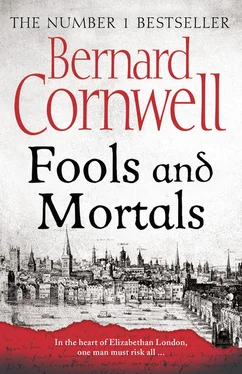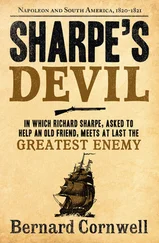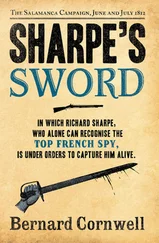‘I did,’ I said curtly, then strolled away from him, following the cloister-like arcade about the courtyard’s edge. I knew he wanted me to praise him because young Simon Willoughby needs praise like a whore needs silver, but there could never be enough compliments to satisfy him. Other than that he is a decent enough boy, a good actor and, with his long blond hair, pretty enough to make men sigh when he plays a girl.
‘It was my idea,’ he called after me, ‘to pretend the candle-stand was a man!’
I ignored him.
‘It was good, wasn’t it?’ he asked plaintively.
I was at the courtyard’s far side now, deep in the shadows. No hint of the flames guttering in the archway could reach me here. There was a door to my right, barely visible, and I opened it cautiously. Whatever room lay beyond was in even deeper darkness. I sensed it was a small room, but did not enter, just listened, hearing nothing above the wind’s bluster and the rain’s ceaseless beat. I was hoping to find something to steal, something I could sell, something small and easily hidden. In Greenwich Palace I had found a small bag of seed pearls which must have been dropped and lay half obscured beneath a tapestry-covered stool in a passageway, and I had hidden the small bag beneath my skirts, then sold the pearls to an apothecary who ground them small and used them to cure insanity, or so he said. He paid me far less than they were worth because he knew they were stolen, but I still made more money in that one day than I usually make in a month.
‘Richard?’ Simon Willoughby called. I kept silent. The dark room smelled foul, as if it had been used to store horse feed that had turned rotten. I reckoned there would be nothing to steal and so closed the door.
‘Richard?’ Simon called again. I remained silent and did not move, knowing I would be invisible in my dark cloak. I liked Simon well enough, but I was in no mood to tell him over and over how good he had been.
Then a door on the courtyard’s far side opened, letting a wash of lantern-light into the rain-soaked courtyard. At first I thought it would be one of the players, come to let us know we were needed, but instead it was a man I had never seen before. He was young and he was rich. It is easy to tell the rich from their clothes, and this man was dressed in a doublet of shining yellow silk, slashed with blue. His hose was yellow, his high boots brown and polished. He wore a sword. His hat was blue with a long feather, and there was gold at his throat and more gold on his belt, but what stood out most was his long hair, so palely blond that it was almost white. I wondered if it was a wig. ‘Simon?’ the young man called.
Simon Willoughby answered with a nervous giggle.
‘Are you alone?’
‘I think so, my lord.’ Simon had heard me open and close a door, and must have thought I had gone into the palace. Then the far door closed, plunging the newcomer into shadow. I was utterly still, just another shadow within a shadow. The young man walked towards Simon, and the guttering torches in the gate arch threw just enough light for me to see that his boots had heels like those on women’s shoes. He was short and wanted to look taller. ‘Richard was here,’ I heard Simon say, ‘but he’s gone. I think he’s gone.’
The man said nothing, just pushed Simon against the wall and kissed him. I saw him haul up Simon’s skirts and I held my breath. The two were pressed together.
There was nothing surprising in this, except that his lordship, whoever he was, had not waited till the play’s ending to find Simon Willoughby. Every time we had played at one of the Queen’s palaces, the lordlings had come to the tiring room, and I had watched Simon disappear with one or other of them, which explained why Simon Willoughby always appeared to have money. I had none, which is why I needed to thieve.
‘Oh yes,’ I heard Simon say, ‘my lord!’
I crept nearer. My tapestry slippers were silent on the stones. The wind fretted loud around the palace roofs, and the rain, already relentless, increased in vehemence to drown whatever the two said. There was just enough light from the becketed torches to see Simon’s head bent back, his mouth open, and, still curious, I crept still nearer. ‘My lord!’ Simon cried, almost in pain.
His lordship chuckled and stepped back, releasing Simon’s skirts. ‘My little whore,’ he said, though not in an unkind voice. I could see that even with the women’s heels on his boots he was no taller than Simon, who is a full head shorter than me. ‘I don’t want you tonight,’ his lordship said, ‘but do your duty, little Simon, do your duty, and you shall live in my household.’ He said something more, though I could not hear it because the wind gusted to drive hard rain on the cloister’s roof, then his lordship leaned forward, kissed Simon’s cheek, and went back to the tiring room.
I stayed still. Simon was leaning against the wall, gasping. ‘So who is the dwarf?’ I asked.
‘Richard!’ he sounded both scared and alarmed. ‘Is that you?’
‘Of course it’s me. Who is his lordship?’
‘Just a friend,’ he said, then he was saved from answering any more questions because the antechamber door opened again, and Will Kemp leaned out. ‘You two whores, come,’ he snarled. ‘You’re needed! It’s the ending.’
My brother was evidently speaking the epilogue. I knew he had composed it specially, draping it onto the play’s end like ribbons on the tail of a harvest-home horse, and doubtless it smothered the Queen with compliments.
‘Come!’ Will Kemp snapped again, and we both hurried back inside.
When we are at the playhouse, we end every performance with a jig. Even the tragedies end with a jig. We dance, and Will Kemp clowns, and the boys playing the girls squeal. Will scatters insults and makes bawdy jokes, the audience roars, and the tragedy is forgotten, but when we play for Her Majesty, we neither dance nor clown. We make no jokes about pricks and buttocks, instead we line like supplicants at the edge of the stage and bow respectfully to show that, though we might have pretended to be kings and queens, to be dukes and duchesses, and even gods and goddesses, we know our humble place. We are mere players, and as far beneath the palace audience as hell’s goblins are beneath heaven’s bright angels. And so, that night, we made obeisance, and the audience, because the Queen had nodded her approval, rewarded us with applause. I am certain half of them had hated the play, but they took their cue from Her Majesty, and applauded politely. The Queen just stared at us imperiously, her bone-white face unreadable, and then she stood, the courtiers fell silent, we all bowed again, and she was gone.
And so our play was over.
‘We shall meet at the Theatre,’ my brother announced when, at last, we were all back in the antechamber. He clapped his hands to get everyone’s attention because he knew he needed to speak swiftly before some of the lords and ladies from the audience came into the room. ‘We need everyone who has a part in Comedy , and in Hester . No one else need come.’
‘Musicians too?’ someone asked.
‘Musicians too, at the Theatre, tomorrow morning, early.’
Someone groaned. ‘How early?’
‘Nine of the clock,’ my brother said.
More groaning. ‘Will we be playing The Dead Man’s Fortune tomorrow?’ one of the hired men asked.
‘Don’t be an arsehole,’ Will Kemp answered instead of my brother, ‘how can we?’
The urgency and the scorn were both caused by a sickness that had afflicted Augustine Phillips, one of the company’s principal players, and Christopher Beeston, who was Augustine’s apprentice and lodged in his house. Both were too ill to work. Fortunately, Augustine was not in the play we had just performed, and I had been able to learn Christopher’s part and so take his place. We would need to replace the two in other plays, though if the rain that still seethed outside did not end then there would be no performance at the Theatre the next day. But that problem was forgotten as the door from the hall opened and a half-dozen lords with their perfumed ladies entered. My brother bowed low. I saw the young fair-haired man with the blue-slashed yellow doublet, and was surprised that he ignored Simon Willoughby. He walked right past him, and Simon, plainly forewarned, did nothing except offer a bow.
Читать дальше












